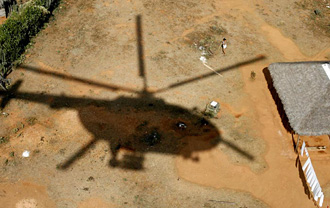 |
 |
 |
 Editorials | Issues | December 2006 Editorials | Issues | December 2006  
Diminished Cuban Military Still a Political Bulwark
 Anthony Boadle - Reuter Anthony Boadle - Reuter


| | The shadow of a Cuban military helicopter is cast over a courtyard as a woman sweeps it in Punta de Maisi in the Cuban eastern province of Guantanamo. (Javier Galeano/AP) |
Havana - Cuba's armed forces will marshal their Soviet-era arsenal in a parade on Saturday to show the world, especially the arch-enemy United States, they remain a force to be reckoned with as their ailing leader Fidel Castro fades.

Aged tanks, rocket launchers and MiG jet fighters will roar through Havana's Revolution Square before a crowd of 300,000 to mark the 50th anniversary of the Revolutionary Armed Forces' (FAR) birth as a ragtag rebel force Castro led ashore from the leaking yacht "Granma" on December 2, 1956.

"Those weapons will never bow before the Empire," read a large banner hung in the square on Friday in a message to the superpower neighbor the Cuban government views as a constant threat.

The military parade, the capital's first in a decade, is also viewed by many as a show of force for any Cubans who think the government has been weakened by Castro's illness.

It is part of a belated 80th birthday celebration for Castro, but it is uncertain whether the guest of honor will be healthy enough to attend.

The Cuban president has not appeared in public since emergency surgery for an intestinal illness forced him to turn over power to his brother, defense minister Raul Castro, on July 31. Castro's family has advised him to stay away and look after his frail health, his niece Mariela Castro told Reuters.

The FAR has lost 80 percent of its troop strength since the demise of Soviet Communism in the early 1990s and is believed to have no more than 60,000 active duty soldiers.

SYSTEM'S MAIN PROP

But Cuba experts and local dissidents say it remains the main prop of the island's one-party political system and will play a large role ensuring order when Castro leaves the scene.

"The parade is a show of force to tell the government's enemies in Cuba and the United States that they are not as weak as believed," said dissident Manuel Cuesta Morua, a Social Democrat.

"The FAR is demonstrating that it is a fundamental pillar of the communist system and will play a larger role in Cuba's future, more important than the Communist Party," he said.

"The message is: 'We are still strong, united and committed to Fidel's mission,"' said Frank Mora, a professor at the U.S. National War College in Washington.

Some see the military as an agent of much-needed economic reform in the cash-strapped communist nation.

Once a formidable fighting force that defeated South African troops in Angola, the FAR has emerged as Cuba's most efficient and economically sound institution under Raul Castro.

Forced to become self-sufficient after the loss of billions of dollars in Soviet aid, the FAR was the first institution to introduce capitalist business practices in Cuba and has a big stake in the economy today.

The military owns lucrative enterprises in agriculture, industry and tourism, including hotels at beach resorts, an airline, a bus fleet, car rentals and a chain of retail shops.

Hal Klepak, of the Royal Military Institute of Canada and author of a book on the Cuban military, believes the FAR controls 60 percent of the sectors of the economy that generate foreign currency and will have a big say in deciding whether economic reform occurs.

"The FAR is at the moment in charge of the transition, literally, and figuratively, in the person of its commander," Klepak said.

As do most analysts, he believes reform, if it comes, will be gradual and well-controlled to ensure Cuba's current political system survives.

One Eastern European diplomat said economic reform will not require a major change for a military that already has a big stake in business.

"Unlike other socialist countries, in Cuba the military officers only need to take off their uniforms and put on a business suit and tie," the diplomat said.

(Additional reporting by Esteban Israel) | 
 | |
 |



